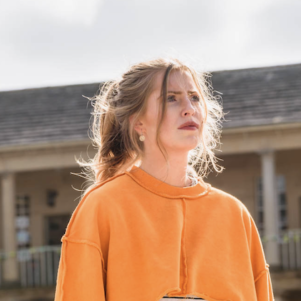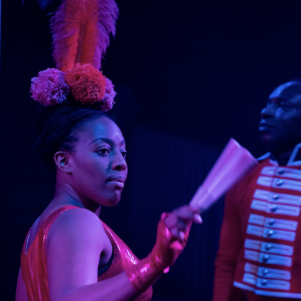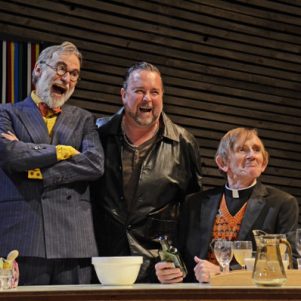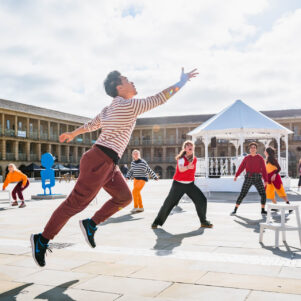I was 11 when I first saw a Northern Broadsides show. My mum’s close friend, the very wonderful Sue Andrews invited us to Salts Mill to see King Lear. It was an incredible experience. I can still remember to this day that vast space in the eaves of the mill being filled by the might of strong northern vowels and powerful drumming. Up until then my experience of theatre had been formal, stuffy and (for want of a more erudite word) posh. Don’t get me wrong – I liked it. I’d been suitably wowed from a distance, but I had never before been welcomed in. I’d never heard those kind of words spoken in a Northern Voice. I’d never really heard Shakespeare and understood it in the moment. That was when I first realised that theatre could be for me.

Northern Broadsides 1999 King Lear – Photo by Nobby Clark
Now I’m on the ‘inside’ so to speak, I can tell you the reason for that turning point. Broadsides people, theatre people… they really are the most wonderful people I know. They know how to welcome you in. They know how to get stuff done (and enjoy life whilst doing it.) And, crucially, they know how to support each other through good times… and bad.

The Cast of Much Ado About Nothing – Photo by Nobby Clark
I write this because just over a week ago, whilst we were all performing in Bury St Edmunds, my beloved Gran passed away.
I have a reputation amongst my peers for being a slight workaholic (on reflection, possibly the understatement of the year!) I’d been busy working away performing both ‘Much Ado’ and our Shakespeare show for children ‘Muddle In Messina’, as well as planning future projects, writing, producing, running education workshops, going to meetings and just generally rushing around.

Sophia in A Muddle In Messina – Photo by Jenny Harper
But this was real life. It came out of the blue and I was knocked for six by the grief of it.
I want to share this experience because it’s not unique. We all have experience loss, and one of the hard truths about working in theatre is that to do what you love, it often takes you away from the people you love most. Every single actor, stage manager, crew member or creative I know has faced this at some point. A bereavement. A family illness. A crisis. A moment when you find yourself faced with an impossible decision. Sometimes the guilt of being away is overwhelming. Sometimes, of course, you have to make the call and head for home.
But my Gran always supported my work as an artist. She taught me to play the piano. She taught me to be independent. She taught me how to keep going when things get tough. And she had seen and supported every Northern Broadsides show I’ve performed in. She even used to collect newspaper cuttings whenever she saw an article or review about the company’s work. When I got the news that she had left us so suddenly, although I wished I could be there with my family, I was so grateful to be surrounded by my Broadsides family.
The team rallied round, they took care of everything. I had some space to grieve and all the hugs, cups of tea and empathy needed to get me through the shock. I was inundated with genuine offers of help, support and even the odd joke. And in the haze of grief I was able to laugh along with the cast – because theatre people really are the best people. They always know what to do.

Sophia in Much Ado About Nothing – Photo by Nobby Clark
And during the show that evening, Shakespeare’s words took on a new meaning for me. I heard Leonato’s words about loss and grief with a new empathy. Antonio’s words about endurance sung through with a renewed clarity. Benedick and Beatrice’s declarations of love represented something so precious, worth clinging on to. The raucous laughter shared by all the audience was genuine. Life is short. We must enjoy it. The joy of the play prevailed and I realised something fundamental about our work.
We need art. We need theatre. We need it because life is short. We need it because it gives us the words to comprehend ideas and feelings that could otherwise overwhelm us. Shakespeare’s plays are a vehicle for understanding the human spirit. They unite us through our shared experiences of joy, love, grief and loss. And Broadside’s stagings of his work are special because they make it accessible, relevant and honest. Young or old, rich or poor, everyone is welcome, everyone is valued and everyone can share in the laughter (or the sadness). In a time where the arts are being heavily cut in many schools and funding for theatre is ever more scarce, I’m proud to be working so hard, with such a wonderful company of people, to keep this work alive. I’d like to think that my Gran would be proud too.
By Sophia Hatfield








